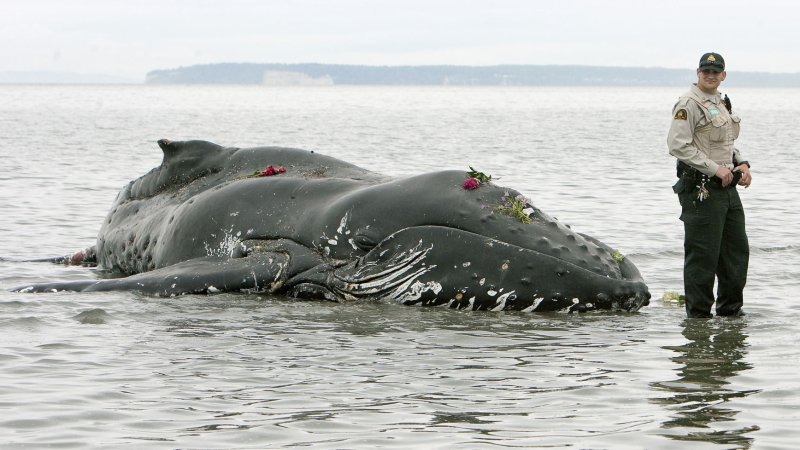1 of 4 | The midday tide rolls in as a federal Fisheries and Oceans officer helps move crowds of people back as they view an eight to ten meter long juvenile humpback whale which died shortly after washing up on the beach in White Rock near Vancouver, British Columbia, early morning June 12, 2012, despite the efforts of local people who tried to save it. The whale was scarred, covered in lice and open sores and appeared malnourished, likely too weak to fight the early morning incoming tides. UPI / Heinz Ruckemann |
License Photo
VANCOUVER, British Columbia, June 12 (UPI) -- A 30-foot young humpback whale beached itself on a suburban Vancouver beach Tuesday and died there, marine officials said.
The federal fisheries department was notified about the whale at 5:15 a.m., the Vancouver Sun reported. At the time, the whale was still breathing, the caller said.
By the time marine officials and a veterinarian arrived, the whale had died.
Word spread quickly in the town of White Rock and hundreds of residents, schoolchildren gathered to see the animal. Local Indians performed a spiritual chant for the whale and schoolchildren placed flowers on its head, the Sun said.
Lindsaye Akhurst, manager of the Vancouver Aquarium's marine mammal rescue center, estimated the whale was about 3 years old, although its gender wasn't immediately known.
The first people to reach the whale cut away fishing net, line and rope from around its body. There were also several deep injuries by its tail fin and the animal was underweight, officials said.
The Canadian coast guard was scheduled to use a hovercraft to tow the body to an undisclosed location for a necropsy, but it wasn't clear what would become of the carcass after that, the Canadian Broadcasting Corp. said.















